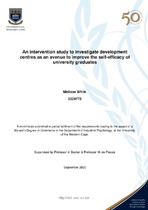An intervention study to investigate development centres as an avenue to improve the self-efficacy of university graduates
Abstract
This study investigated development centres as a method to improve the generalised self-efficacy of university graduates. This research was motivated by the various challenges graduates face in order to successfully transition into the world of work. To reach employability, graduates face high unemployment rates, inequality, a slow growing economy, high employer expectations, and a skills mismatch, all of which impacts their self-efficacy, performance and motivation levels. The sample population for this research included Industrial Psychology graduates at a select university in the Western Cape, South Africa (n=17). A quasi-experimental methodology was implemented where an intervention group (n=7) and a control group (n=10) were taken through a development centre approach. The primary research objective was to identify whether the generalised self-efficacy of graduates can be positively affected by a development centre approach in the short-term and long-term.

